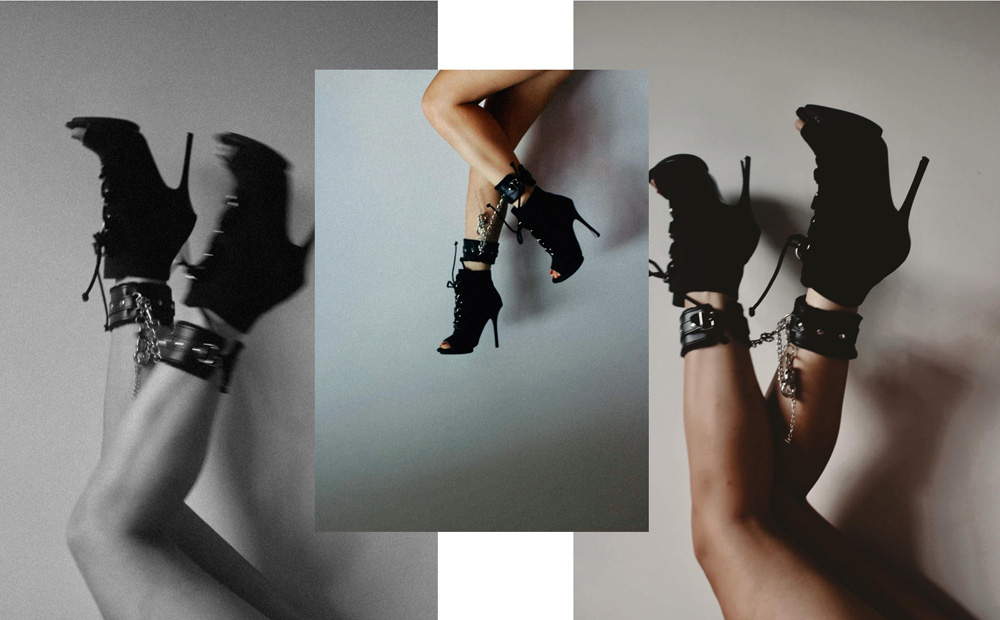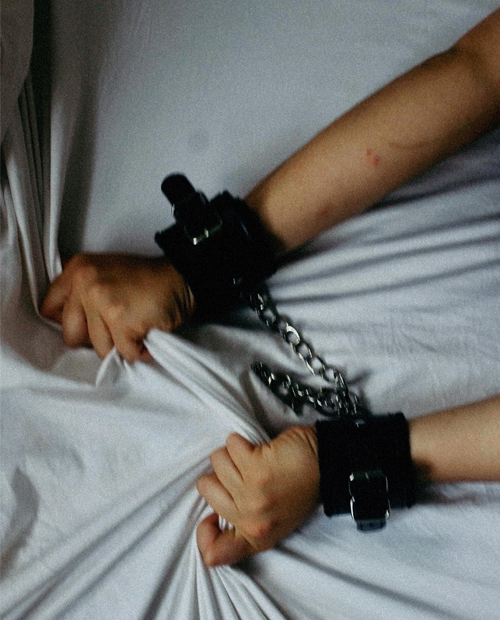
Freud’s Castration & My Objectification
Words: Faith Thurnwald
Photography: Faith Thurnwald
Models: Isabell Snowdon
He asks me “what do you like?” and I don’t know. My role in sex has always been passive, I don’t need to decide what I want done to me, I just want it done. I was almost surprised as a feminist when I started having sex that I enjoyed the submissive role. Sex is confusion – I find arousal in my domination but I’ll never give up my power. Every man I’ve been with has his particularities and knows what he wants. When it is my turn, and he asks what I like, I say I’m still figuring it out, but will I ever decide, when my only road to pleasure is through passivity? Sexual experimentation always takes place first in fantasy, and mine never varied from the heterosexual norm, the ultimate attraction of the hegemonic male dominator, I the damsel in distress, he the knight, prince or whoever.
When I see myself in his eyes I find arousal, his objectifying gaze begets sexual desire, either something went very wrong in my childhood, or this is normal and therefore there is a theory to explain it. Although Freudian psychoanalysis has been largely discredited, and his place in modern psychoanalysis is seldom ever used further than to explain an ex boyfriend who was weirdly close to his mother, Freud’s definition of female castration perhaps has useful applications. The Freudian psychoanalysis of female castration poses that the absence of male genitalia influences the way in which we women are able to enjoy and approach sex. The void between our legs, the absence of the phallus contributes to the pleasure we take in our objectification. As girls grow up they discover their ‘organic inferiority’ as Freud so eloquently put it, and although wildly sexist, I too remember the puzzlement, confusion and jealousy over not having a penis, and was quoted saying “I want a willy so I can shake it”. The Freudian theory states that from birth we are assigned our sex pronoun “he” or “she” and in turn we too are assigned the place of “subject” or “object”, and although this may be too gender normative for todays fluidity, it raises some interesting points. The male signifier; the phallus, determines ones role as the dominator or the submissive, running off the basis the masculinity equals activity and femininity equals passivity. As the object, women are the passive receiver of the male gaze (and phallus if we’re lucky) and only through it can we feel sexual desire.
The only sexual pleasure women can enjoy then, is through their objectification. It is through this that we have learnt to associate sexual desire with submission and masochistic fantasies as the normative heterosexual model. The hegemonic roles of male and female which we enact everyday are rooted within the social conscience. Then, is it ingrained within my psyche from socialization of misogynistic sex roles, that the pursuit of sexual pleasure can only be achieved through my degradation?

When I read over the basics of female castration anxiety something clicked. My conscious critical thinking self finds descriptions of degradation, domination, rape and rapture appalling, however underneath that conscious self, there has always been a small part of me which comes alive at the notion, and dare I say, aroused. Is it due to my ‘castration’ then that I find pleasure through the passive, or am I constructed to do so from birth through the ever-present gender roles that follow me like a shadow?
Female castration is forever imbedded in the female psyche as an open wound, through which BDSM imitates, wherein we are beaten, gouged and whipped. The fictional memory of our castration so entrenched within our sex that it defines the dynamics of physical intimacy between male and female. The imagery it denotes, painting the female as the wounded victim, continuously bleeding from the void between her legs and the male’s phallus dictating his narcissism and arousing a delusional need to dominate.
Does my need to be objectified inflate your fragile ego, boosting the insecurities of man… should the question, then, not be why do I find pleasure in the passive, but why are men so insecure that the only thing that can placate them is power through domination? Why do you want to choke me, and how can we step outside of our socialized selves and enjoy sex outside the constructed?


References
Freud S 2010, The Psychology of Love, Penguin Books, Melbourne.
Kaplan A 1983, Woman and Film: Both Sides of the Camera, Methuen, London.
Kaplan J L 1994, Female Castration Anxiety, American Imago, vol. 51, no. 4, pp. 471-489, viewed 25 January 2021, https://www.jstor.org/stable/26303849?seq=1#metadata_info_tab_contents
Sheets R 1991, ‘Pornography, Fairy Tales, and Feminism: Angelia Carter’s “The Bloody Chamber”’, Journal of the History of Sexuality, vol. 1, no. 4, pp. 633-657, viewed 10 August 2020.
For More: Porn – Do You Watch It?

0 comments